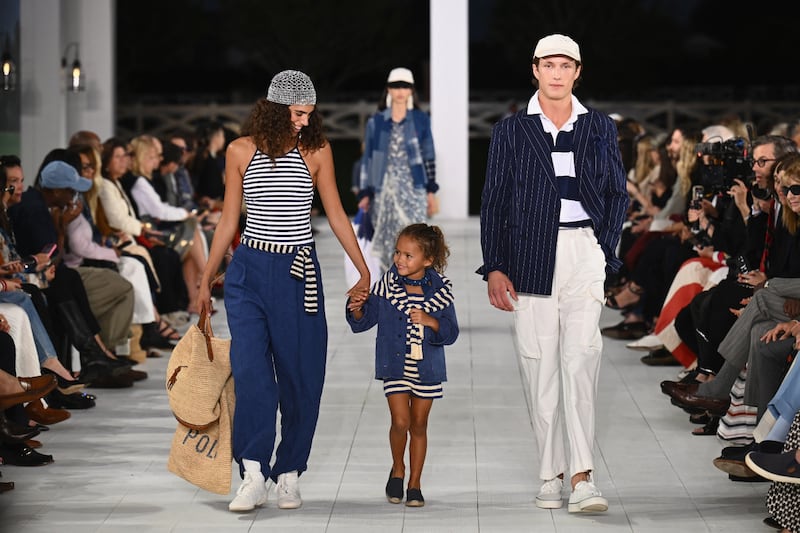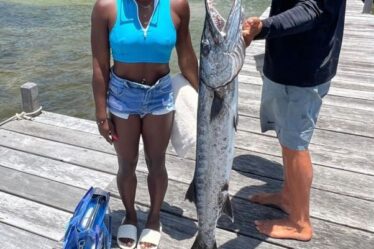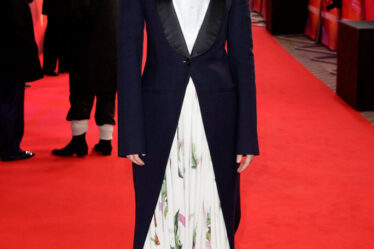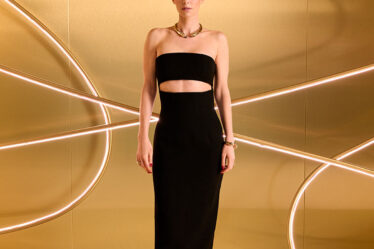
BRIDGEHAMPTON, NEW YORK—Ralph Lauren’s recent runway shows have been equally meant to invite guests into a different corner of his universe as they are to present the brand’s latest collections.
Recent settings have included an homage to the designer’s Manhattan apartment, his Double RL Ranch in Colorado (inside a warehouse in Brooklyn’s Navy Yard), and his actual New York City design studio. On Thursday, for the brand’s spring 2025 runway show, he brought a few hundred guests even further, to a location that’s been part of his life since his twenties: The Hamptons.
Nestled three hours east of New York City, the Hamptons enclave on the south end of Long Island has long been a destination for the wealthy and well-dressed (the average home price in the night’s locale of Bridgehampton is just north of $4 million, according to Zillow). Lauren has a house in Montauk, on the tip of the island.
“A lot of the life here is so quintessential to the lifestyle we portray,” said Ralph Lauren chief executive Patrice Louvet. “It felt natural that at some point you should have a cultural moment here in the Hamptons.”
A runway was constructed on Khalily Stables — a nod, of course, to the brand’s own history with the sport, forever immortalised with its logo. Guests — including Laura Dern, Tom Hiddleston, Jude Law, Joey King and even First Lady Jill Biden — entered the space through an imposing white gate. Horses trotted in a field abutting the grounds, which had been decked out with classic cars, a makeshift tack room filled with equestrian equipment and wooden signs bearing the brand’s logo.
A runway, constructed out of white wood, was set against an illustrated backdrop of rolling fields and a blue sky. The show featured looks from three of Lauren’s sub-brands — Ralph Lauren Collection, Ralph Lauren Purple Label and Polo Ralph Lauren. The fashion itself was an amalgamation of everything the brand is known for: Items with western wear-inspired details like studded belts and fringed jackets, sleek suiting and silky cargo pants and jackets. There was an American flag sweater, USA-logoed merchandise and, of course, polo shirts. A new collection of structural bags, inspired by Lauren’s love of cars and called “The Ralph,” also made their debut.
There were nods to the location throughout: Beachy crochet sets, a blue-and-white opening colour palette and plenty of horse motifs, from a tie printed with them to velvet slippers embroidered with an equine illustration. (During the show, horses were visibly grazing behind the runway.) Afterwards, guests adjourned to another tent that contained a full recreation of the brand’s New York City hot spot restaurant The Polo Bar, complete with brown leather booths, a dark wood-panelled ceiling and its famous burgers.
Despite the grand scale of the event, it contained nods to family, fitting for a location that Lauren himself has a family vacation home. Men, women and children walked the runway, oftentimes hand-in-hand with one another. Supermodel Christy Turlington, who has been a staple at Lauren’s show as of late, was joined on the runway by her daughter Grace Burns and nephew James Turlington; she walked the finale holding hands with longtime pal and fellow Super Naomi Campbell. TikTok’s favourite “trad wife” Nara Smith sat in the front row to watch her husband, Lucky Blue Smith, walk the runway.
The event was another flex for a brand that’s been reaping the rewards of a multi-year turnaround effort. In August, it reported first quarter revenue of $1.51 billion. Its stock price is up 20 percent in 2024, and hit an all-time high earlier this year. While sales have only inched higher – with strong growth in Europe and Asia offsetting weaker revenue in the US, where the brand is reducing its presence in some department stores – profits are expanding much faster.
The elevated branding on display in Bridgehampton is a major reason why: This sort of grand-scale image-making and careful nurturing of high-income customers has enabled the brand to consistently raise prices without losing customers. While it’s not quite earned the same global status as the European luxury giants, it certainly is exercising the same sort of marketing muscle.
“[Lauren] operates more like a movie director than he does a traditional designer,” said Louvet. “He creates these movie sets with the storyline, and then the customer is actually an actor. That’s what tonight is.”
The World of Ralph Lauren
Ralph Lauren has become synonymous with world building, whether it’s through its always-booked restaurants in New York, Chicago, Milan, Chengdu and Paris, or its pop-up shop at this week’s US Open tournament 90 miles west of Thursday’s event in Flushing, Queens. But setting the show in the monied Bridgehampton also presents an opportunity for Ralph Lauren to engage top clients from the US, Europe and Asia in a particularly exclusive location.
“We want to make sure our best clients have these unique brand moments,” said Louvet. “It’s a way for them to experience the brand differently.”
As fashion becomes a bigger part of culture, clients want to be a part of the runway action more than ever. And brands, increasingly, are using them as a marketing tool to appeal to top clients who are seeking experiences. At Oscar de la Renta’s pre-Spring 2025 show in June, for example, the brand invited no traditional press, instead preferring to fill seats with influencers and top clients.
“To bring them to the show, to see the clothes on the runway and see ‘Oh, I can get that one, I can buy that one,” said Dallas-based designer Nardos Iman, who is showing for the third time in New York this season. For her show at the famed Upper East Side restaurant Daniel — a 5-minute walk from its Madison Avenue storefront — 50 percent of the attendees are clients. “The revenues bring in themselves.”
They’re a particularly important audience to court right now. After the frothy years immediately following the pandemic, luxury spending has taken a nosedive. Ralph Lauren is projecting sales growth in its current fiscal year of just 2 to 3 percent excluding foreign-exchange fluctuations. The struggles of some competitors that also try to straddle the line between accessible fashion and luxury underscore the need to cater to the consumer that will survive downturns.
Louvet said he believes that the brand has been able to avoid the worst impacts of luxury’s downturn because their messaging is so consistent. At weekly lunches, he said, Mr. Lauren asks him the same question: “Are we staying true to who we are?”
“It’s consistent, it’s settled, there’s nothing outrageous about it, there’s nothing avant garde about it,” said Gary Wassner, CEO of consultancy Hilldun Corporation. “But at the same time, it represents a comfortable place in the hierarchy of luxury design.”
In many ways, that place feels more secure than it’s been in years. As New York-based brands fight for attention over the next few days of New York Fashion Week, Ralph Lauren has managed to carve out its own moment in the spotlight. It’s likely the only homegrown American brand that could lure the industry three hours away from the city just hours before the start of New York Fashion Week, and put on a display only European megabrands could compete with.
“The great brands always find ways to transport their best supporters — celebrities and clients — whether it’s by private jet or Jitney,” said Milton Pedraza, founder and CEO of the consultancy The Luxury Institute. “Some brands don’t have the resources, the creativity, the constituency. Ralph absolutely does.”



